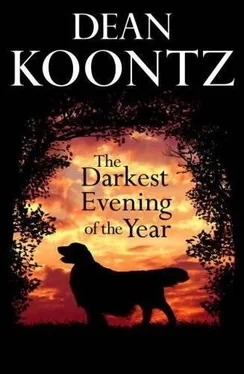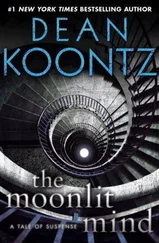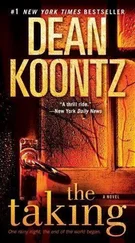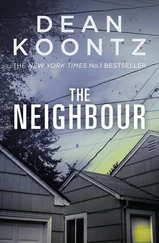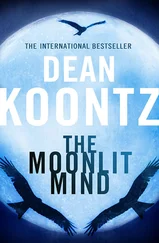Her position was irrational, but that didn’t surprise him. Any attempt to reason with her about this would be as great a folly as commanding the sea to stop breaking on the shore.
“I have to talk this over with Amy,” he said. “I can’t decide for her.”
“Oh, I’m sure she’ll do it. She’s so dog nuts. Tell her there’s a funky little dog here named Piggy, needs to be rescued. But better e-mail me within an hour.”
“An hour isn’t enough.”
She said, “I’ve worked this out with Mr. Deep Pockets, but he could turn skittish on me.”
Vanessa hung up.
Brian turned to Amy.
“The way you look,” she said.
A cold sweat greased the back of his neck. He figured the blood had drained out of his face because his lips felt half numb.
“Like Death,” Amy said, “like Death looking for someone to cut down and take away.”
Harrow says, “Cool as ice.”
Getting off the kitchen stool from which she had made the call, sitting across from him at the table, she says, “Brian always was easy.”
“Dry ice.”
As the moon draws ocean tides, so she seems to bend the light of the candles to her by a gravity of her own.
“How much did you prep for that?” he asks.
“No prep. Just played off him.”
“Not off him. Played him.”
She smiles. “Like a piccolo.”
“He should know you by now.”
“I wasn’t this much me, back then.”
“You were never less.”
“Was I never a child?”
“Were you?”
She does not answer.
“Where did you learn?”
“You mean, to lie like that?”
“You make lying poetry.”
“Started learning from Mama’s tit.”
“You’ve never told me about your mother.”
“She’s dead.”
“That’s it?”
“What else could there be?”
He watches her sip red wine. It looks black on her lips, and then she licks it away.
They are in a new place in their relationship. Anticipation of what is coming gives them a greater sense of shared destiny.
Harrow feels that he can ask questions that were previously off limits. He senses, however, that he cannot yet ask her why she has kept Piggy all these years or why she had a child when she believes, as certainly she does, that nothing matters but the self, the moment, and the thrill.
“What about your old man?”
“He was a liar’s liar.”
“What did he do?” Harrow asks.
“Nothing he didn’t want to.”
“My kind of guy.”
“He taught history.”
“History is lies?”
“The way he taught it.”
“Does he still teach?”
“He’s dead.”
“They both died young.”
“Yes.”
Harrow takes a shallow sip of his wine. He never drinks to excess in her company.
“Amazing to hear you talk so much on the phone.”
“With anyone, a lot of talk always means it’s lies.”
She is implying that she doesn’t lie to Harrow.
He says, “I’m remembering two months ago-Karen and Ron.”
“What a fun couple.”
They had been twentysomethings, adventurers, backpackers, hiking the coast.
“You were a chatterbox with them,” he says.
A guidebook led Karen and Ron to this remote, picturesque cove. They had walnut walking sticks, expensive gear, fresh good looks, and a love of nature.
She says, “Women come on cool to me.”
“Because their men come on hot.”
Moongirl had done more than open the floodgates of charm. She had posed as a discreet lesbian, and had subtly but repeatedly hit on Karen.
“Poor girl was so flustered.”
“But flattered,” Harrow says. “She didn’t go that way, but she was flattered you wanted her-and relieved you didn’t want Ron. You disarmed her.”
“We were best pals, me and Karen.”
The couple had asked if they could camp the night on the beach, and the four of them had enjoyed a surfside picnic by lantern light.
Karen and Ron didn’t notice that their dessert wine and that of their hosts were poured from different bottles.
Later, excruciating pain had awakened them to the indifferent stars, the icy moon, the siren of silver light, and their hostess’s eyes as green as an arctic sea.
“Ron was boring,” she says.
“He broke so fast.”
Harrow participates in such ceremonies only when she asks him to assist her. Just watching, he always has more than enough to keep him entertained and occupied.
She says, “Karen was interesting.”
“Quite a marshmallow roast,” Harrow agrees.
In his mind’s eye, he sees Moongirl on that night, like an Aztec goddess accepting sacrifices made unto her.
“Karen wouldn’t give up hope,” she says.
“Well, at the end.”
“It was a long way to the end.”
Moongirl drinks wine without caution. She has no fear of Harrow. Besides, even when she’s inebriated, her senses are sharp and her reflexes uncannily quick, as he has seen.
“Why do they hope?” she asks.
“Not all of them do.”
“The ones that do hope-why?”
“They have nothing else.”
“But hope is a lie,” she says.
When she looks at the candles, the flames leap in the red-tinted votive glasses, and she smiles.
He has seen her do this before, and he has asked her how she commands the flames, but she never answers.
Raising her eyes from the candles to Harrow, she says, “Hope is a lie to yourself.”
“Most people survive by self-deceit.”
“They have nothing.”
“Everyone has nothing.”
“Oh, we have something. We have them.”
She regards the candles again, smiles, and ribbons of flame twist, unravel, then ravel back closer to their wicks.
Harrow thinks she does it with a trick of breathing, but he has never seen her nostrils flare or her lips part to betray her.
“One thing is not a lie,” he says. “Power.”
“Brian is lying to himself right now,” she says.
“I’m sure he is. The world always brings you kindling when you need it.”
While driving, Billy Pilgrim put on a soft-brimmed, green-felt Tyrolean hat with a small red-and-gold feather in the band, and he inserted a false gold cap over his two upper central incisors.
When he had found the address he wanted and had parked at the curb, he slipped on a pair of horn-rimmed spectacles with thick lenses of plain glass.
Now that most cell phones were also cameras, you never knew when some meddlesome passerby might take a snapshot of you just prior to or immediately subsequent to a criminal act. Digital technology had contributed to a loss of privacy that he found appalling.
Billy did not consider himself a master of disguise, but he understood the basics of obscuration and camouflage. Only a simple costume was required to foil facial identification from a photograph. A soft-brimmed and somewhat fanciful hat and dark-rimmed glasses went a long way toward changing the look of the face. The gold dental cap gave him a slightly bucktoothed aspect, which made his face seem rounder than it was.
When he got out of the Land Rover, he locked the door. This was a fine neighborhood, but he believed in taking every precaution when he had a dead body under a blanket in his vehicle.
The middle-class to upper-middle homes were in good repair. The landscaping appeared to be well maintained, and landscape lighting set an artful and welcoming mood, with path lamps flanking walkways.
Although the evening was still early and the autumn air warm, no children played in the front yards or bicycled in the street. With predatory pedophiles more numerous by the year and organizing on the Internet to share hunting tips and abduction techniques, parents kept their kids on a short leash during the day and indoors after dusk.
Читать дальше
Конец ознакомительного отрывка
Купить книгу
